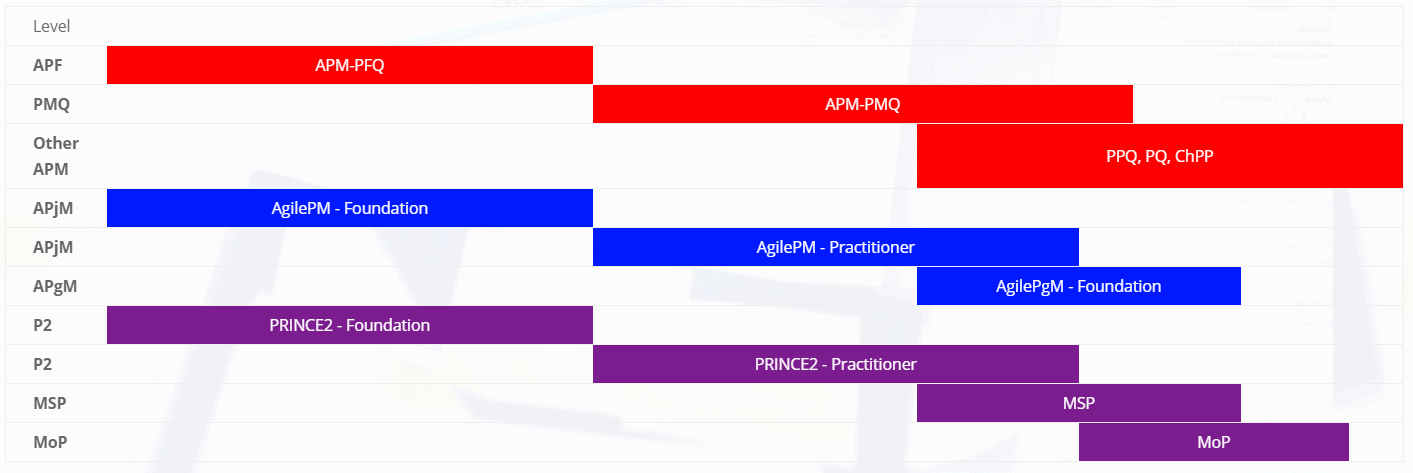Professional Development
If you are planning a career in Project Management or want to advance your career further in this field, CUPE International has all the answers you need.
What’s the right Project Management path for me?
Study options
Taking the exams
Continuing Professional Development
What’s the right Project Management path for me?
Study options
Taking the exams
Continuing Professional Development
Careers in Project, Programme and Portfolio Management (PPM)
What’s the right path for me?
In the UK there are three main routes to becoming certified in Project Management. Each has its benefits and the route you choose will be dictated by your present
The Association of Project Management (APM) 
APM offers two entry-level qualifications in Project Management; Project Fundamentals Qualification (PFQ) and Project Management Qualification (PMQ). These are
PFQ offers a fundamental awareness of project management terminology and is for those wishing to gain a broad understanding of the principles of the profession. This qualification will allow the individual to make a positive contribution to any project. No previous knowledge or experience is required to study for this qualification. PMQ allows individuals to demonstrate
More information on APM Qualifications can be found here APM Qualifications
APM-PFQ syllabus APM-PFQ syllabus
APM-PMQ syllabus APM-PMQ syllabus
Agile Project Management (APMG) 
Agile Project Management is
AgilePM syllabus AgilePM Syllabus v2.0
PRINCE2
The most established Project Management methodology in the UK, PRINCE2 is a process-based method which focuses on business justification, the
Study options
CUPE offers various ways in which you can study the Project Management methodologies. These include Classroom courses, e-learning, in-house courses, corporate e-learning and workshops. Click on the links below for more details.
| Classroom courses | E-learning |
In-house courses |
Workshops |
Corporate e-learning |
|
| APM-PFQ | Info | Info | Info | Info | Info |
| APM-PMQ | Info | Info | Info | Info | Info |
| AgilePM Foundation | Info | Coming soon | Info | Info | Coming soon |
| Agile PM Practitioner | Info | Coming soon | Info | Info | Coming soon |
| PRINCE2 Foundation | Info | Info | Info | Info | Info |
| PRINCE2 Practitioner | Info | Info | Info | Info | Info |
Taking the exam
The diagram below shows information on the various exams available from CUPE.
|
|
|
|
|
|
|
|
|
|
Format |
Duration |
No. of questions |
Pass Mark |
Online |
Test Centre |
|
APM-PFQ |
multiple choice |
1 hour |
60 |
60% |
✔ |
✔ |
|
APM-PMQ |
written answers |
3 hours |
10 from 16 |
55% |
✘ |
✔ |
|
AgilePM Foundation |
multiple choice |
40 minutes |
50 |
50% |
✔ |
✔ |
|
Agile PM Practitioner |
multiple choice |
2½ hours |
80 |
50% |
✔ |
✔ |
|
PRINCE2 Foundation |
multiple choice |
1 hour |
60 |
55% |
✔ |
✔ |
|
PRINCE2 Practitioner |
multiple choice |
2½ hours |
68 |
55% |
✔ |
✔ |
Continuing Professional Development (CPD)
APM & APMG all operate digital badge schemes managed by Acclaim/ Credly which allows your digital badge to be displayed on LinkedIn and other social media.
APM
The Association for Project Management offers a membership scheme which gives members access to knowledge resources, a quarterly magazine, preferential rates on APM qualifications, free attendance at knowledge and networking events.
The APM qualifications continue past APM-PMQ to eventually reach Chartered Project Professional (
The Road to Chartered APM Chartered Documents
Agile Project Management – APMG
Agile Business Consortium offers a membership scheme which gives members free templates and resources, free access to member training days, 40% discounts on general events such as the Agile Business Conference as well as discounts on other DSDM examinations.
To maintain their Agile Project Management Practitioner certification, delegates will have to re-take the Practitioner exam every 5 years.
The Agile study route continues with Agile Programme Management for those working at a Programme level.


